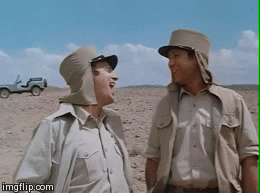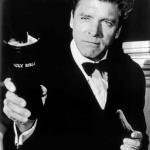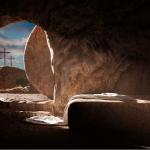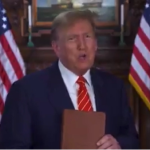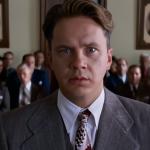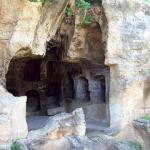Nicolae: The Rise of Antichrist; pp. 244-246
Tsion lay on the floor beneath the seats. Buck pulled up to two uniformed and helmeted guards at a lowered crossbar. The one on the driver’s side of the bus signaled that he should slide open the window and then spoke to him in Hebrew.
“English,” Buck said.
“Passport, visa, identification papers, vehicle registration, any goods to declare, and anything on board you want us to know about before we search should be passed through the window or told to us before we raise the gate.”
Buck Williams coolly explains that he’s just an innocent American businessman, innocently driving across the border in the dead of night in an old school bus carrying innocent “foodstuffs, gasoline, oil and water.”
This is the plan. Tsion will hide under the seats, where border guards would never think to look. And Buck will calmly reassure the authorities that he’s not smuggling anything — especially not the fugitive they’re all looking for.
That should work, right? I mean, these guards are just the Israeli Defense Force, and what does the IDF know about policing border crossings and checkpoints?
“Anything else?”
“Anything else?” Buck repeated.
“Anything else we need to see, sir! You will be interrogated inside, and your vehicle will be searched over there.” The guard pointed just beyond the building on the right side of the road.
“I have some clothing and some blankets,” Buck tells the guard. “Those are the only other things I am carrying.”
In the most legalistic sense, Buck wasn’t technically lying until he got to that word “only.” But for the rest of this chapter he tells one lie after another in his efforts to keep Tsion Ben-Judah hidden from the guards intent on capturing and killing him.
I’m perfectly fine with the ethics of that. I don’t have any weird Kantian qualms about lying in such a situation. In fact, I’m happy to describe lying in this situation as an ethical obligation — to say one ought to lie to people with guns who are intent on killing innocents if they learn the truth. But it’s surprising to find the authors seeming to agree with me here. Back in the first book, Buck agonized over what he would do if the Antichrist himself asked him direct questions that might put the lives of his friends in danger. He was determined not to lie, even to the Antichrist, even if that potentially meant the death of every member of New Hope Village Church’s congregation.
That’s changed. But it doesn’t seem that Buck and the authors have developed a more mature understanding of the ethics of lying to tyrants. It seems, rather, that they’ve simply forgotten they used to think otherwise.
So here goes nothin’. Buck pulls the bus over to the side as instructed, parking it where it can be searched by the guards while he goes inside to be “interrogated.”
Tsion reached past Buck’s chair and grabbed his ankle. Buck took it as encouragement, as thanks, and, if necessary, farewell. “Tsion,” he whispered, “your only hope is to stay as far in the back as possible. Can you scoot all the way to the back?”
Let me commend Jerry Jenkins on his restraint here. He refrains from having Tsion scold Buck for suggesting that their “only hope” is anything other than the power of Jesus’ name. As a relatively new convert, I guess, Tsion hasn’t yet fully mastered all of the sanctimonious lingo.
Jenkins swiftly makes up for this by giving his heroes one last chance to display their respective piety to one another before the guards take charge:
“Tsion, Michael’s wife said something to me when I left. I didn’t understand it. It was in Hebrew. The last two words were something like Y’shua Hama-something.”
“Y’shua Hamashiach means ‘Jesus the Messiah,'” Tsion said, his voice quavery. “She was wishing you the blessing of God on your trip, in the name of Y’shua Hamashiach.”
“The same to you, my brother,” Buck said.
“Cameron, my friend, I will see you soon. If not in this life, then in the everlasting kingdom.”
That last sentence undercuts and reverses everything that LaHaye and Jenkins were trying to do with all that praise-chorus Hebrew in the previous bit. It shows that, despite the authors’ claims otherwise, Tsion Ben-Judah does not really believe in Y’shua Hamashiach, but in Y’shua H. Christ.
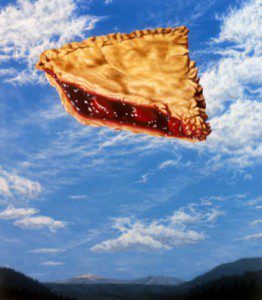
We’ve been told that Tsion became a born-again Christian because his research on the identity of the Jewish Messiah led him to conclude that Jesus of Nazareth was that Messiah. But it seems, rather, that Tsion instead stopped believing in that Messiah. Tsion doesn’t think that Jesus is the Jewish Messiah at all — he thinks that Jesus is the pseudo-Lutheran, vaguely neo-Platonic “Messiah” of otherworldly white American evangelicalism. And that is a very, very different thing than the Messiah of the Hebrew scriptures. (It’s also a very, very different thing than the Christ of the New Testament.)
The otherworldly American “Messiah” has a kingdom, but “not in this life.” There’s nothing Jewish about that idea, no matter how much Tsion or the authors try to dress it up with the Hebrew phrases they learned from an old Lamb album.
The guards were approaching, obviously wondering what was keeping Buck. He shut off the engine and opened the door, just as a young guard approached. Buck grabbed a water can and shouldered his way past the guard. “Been having a little trouble with the radiator,” he said. “You know anything about radiators?”
Distracted, the guard raised his eyebrows and followed Buck to the front of the bus. He raised the hood and they added water. The older guard, the one who had talked to him at the gate, said, “Come on, let’s go, let’s go!”
Jenkins’ narration rarely gives us a clear picture of the scene staged before us. This is a border crossing, with guards. But what does it look like? Is there a fence, a wall, a turnstile? And how many guards?
I realize that Jenkins is the brand-name leader of a popular “Writer’s Guild.” He gets paid top-dollar for writing instruction, coaching and editing, and I wouldn’t want to overstep my bounds by presuming to give writing advice to such an esteemed and wealthy artist. But if I had to give one piece of writing advice to Jerry Jenkins it would be this: Play some Dungeons & Dragons. That would force him to learn how to sketch out a scene like this one for his readers. In a game of D&D, you can’t get away with telling the players that “You come to a, like, large space with a bunch of, like, monsters in it.” The game requires brevity and precision. Players need to know what they see, who’s there, and what they’re dealing with.
It took me several readings of this chapter to figure out what Buck is seeing here, who’s there, and what he’s dealing with. And even now I’m not 100-percent sure, but I think what we’ve got is just the two guards, a young one and an old one.
So, then, it’s two-on-two. A fair fight. The authors may have torturously discussed their ethical qualms about lying to the Antichrist, but they haven’t indicated any such moral reservations about the righteous use of violence.
I don’t mean lethal violence, necessarily, but something like the “Feet. Hat” maneuver from Spies Like Us seems called for here.
This is, after all, a stock set-piece from action movies, and in a substantial percentage of those movies, the scene ends with the two guards tied up, wearing only their underwear, while the heroes escape wearing their uniforms.
In those movies, the guards are tied up, not killed, because in most such stories an aversion to unnecessary killing is part of what makes the Good Guys the Good Guys. That’s not true here in the moral universe of Left Behind. Here the category of “innocents” does not exist, and mass-slaughter of the infidels is portrayed as the epitome of Christ-like behavior. That’s the culmination of history in these books — the ultimate answer to the question “What Would Jesus Do.” In the not-final volume of the series, The Glorious Appearing, the authors tell us that WJWD is this:
The great army was in pandemonium, tens of thousands at a time screaming in terror and pain and dying in the open air. Their blood poured from them in great waves, combining to make a river that quickly because a swamp. …
Given that this violent killer Jesus is the spiritual and ethical lodestone for Buck and Tsion, it’s odd that they don’t at least consider trying to overpower these two guards.
That might not seem practical. These guards are trained soldiers, after all. And while Jenkins only mentioned that the guards were “uniformed and helmeted,” I’ve been through border crossings and check points run by the IDF, and what I remember most isn’t the uniforms and helmets, but the huge automatic rifles they all carried at the ready.
Asking a feeble bookworm like Tsion to overpower a heavily armed soldier seems like an implausible plan, but remember that our heroes don’t have a plan — they’re stepping out on faith and awaiting God’s miraculous deliverance.
And again, keep in mind that our heroes, like the authors, aren’t coming from a Sermon-on-the-Mount perspective here. They worship a muscular, violent Jesus, so you’d think they’d be expecting a muscular, violent miracle. After all, the Bible is full of stories in which stepping out on faith and awaiting God’s miraculous deliverance meant miraculously overcoming a superior foe in battle. That happened for both of Buck and Tsion’s good friends — Moishe and Eli, as well as for Abraham, Joshua, David and scores of others in the Bible.
If Shamgar could slay 600 Philistines with an ox goad, then why shouldn’t Buck and Tsion be able to overcome a couple of guards with, say, a tire iron?
I briefly expected something like that here. Buck manages to draw the guards over to inspect the radiator with him. Jenkins has been telling us, over and over, that the bus has been running hot and the radiator is ready to blow. I briefly thought that’s where this was leading …
“Been having a little trouble with the radiator,” he said. “You know anything about radiators?”
Distracted, the guard raised his eyebrows and followed Buck to the front of the bus. He raised the hood and they added water. The older guard, the one who had talked to him at the gate, said, “Come on, let’s go, let’s go!”
I was, momentarily, surprised and impressed by the way Jenkins set this up. Buck would yank the hose, directing the hot steam into the faces of the two guards, allowing him and Tsion to tie them up and make their escape. This “rattletrap,” this “less-than-desirable conveyance” that Buck had been complaining and worrying about ever since they hit the road would prove to be the providential tool of divine deliverance. The very thing Buck had most resented — the old school bus’s faulty radiator — would turn out to be the thing that God planned all along to use to see them safely across the border. What had seemed belabored and repetitive in the past two chapters would turn out to be an unexpectedly thoughtful (if heavy-handed) use of foreshadowing.
But, nope. None of that happens.
“Be right with you,” Buck said, aware of every nerve in his body. He made a huge noise, slamming the hood. The younger guard moved toward the door, but Buck passed him, excused himself, put one foot on the steps, and tossed the water can into the bus. He thought about “helping” the guard search the bus. He could stand with him and point out the blankets and cans of gas, oil, and water. But he had already come dangerously close, he feared, to making them suspicious. He came back off the bus and into the face of the young guard. “Thanks so much for your help. I don’t know much about engines, really. Business is my game. America, you know.”
Because nothing throws off suspicion quite so much as reassuring others that they have no reason to be suspicious, no sir, no reason for suspicion because there’s nothing suspicious here at all.


